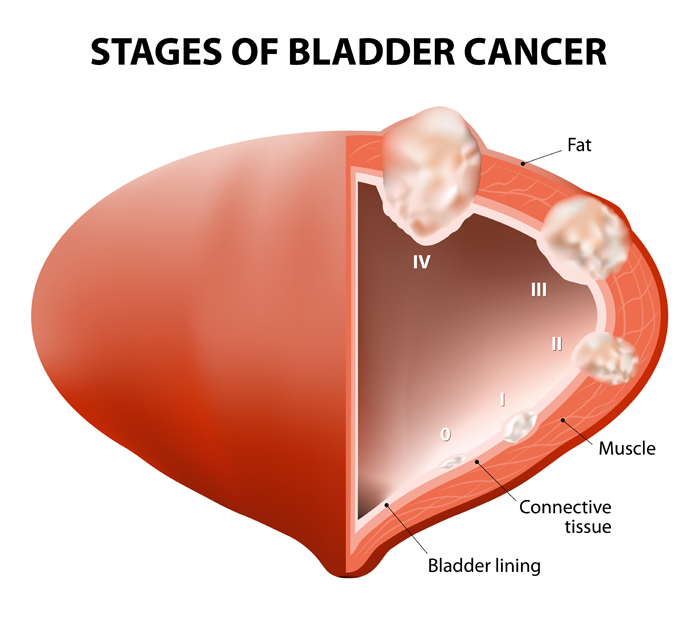Best Bladder Cancer Treatment in Kondapur, Hyderabad
Bladder cancer is a type of cancer that develops in the bladder. The bladder is a hollow space that holds the urine after filtration from the kidneys. Just like other cancers, it starts when the cells grow uncontrollably and form a tumour.

What are the kinds of Bladder cancers?
The place and type of cell where cancer begins determine the type of bladder cancer. Doctors make use of these to determine the best treatments for you.
Types of bladder cancers include;
- Urothelial carcinoma also known as transitional cell carcinoma occurs in the cells lying inside of the bladder. It is the most common amongst others.
- Squamous cell carcinoma is related to a long term irritation in the bladder, maybe from an infection or from long-term use of a urinary catheter.
- Adenocarcinoma develops in cells that make up mucus-secreting glands in the bladder.
- Small cell carcinoma is very rare bladder cancer. They originate in nerve-like cells called neuroendocrine cells. These cancers often grow quickly and usually need to be treated with chemotherapy.
- Sarcoma starts in the muscle cells of the bladder but is again very rare.
What are the symptoms of bladder cancer?
Bladder cancers may easily be identified in the early stages and treated by medical professionals. Bladder cancer signs and symptoms include;
- Blood in the urine (hematuria)
- Frequent urination
- Painful urination
- And sometimes back pain
What causes cancer in the bladder?
Bladder cancer starts to develop when bladder cells change (mutation) in their DNA. A cell's DNA instructs them what to do. The changes result in the cells multiplying rapidly. These abnormal cells form a tumour that can invade and destroy normal body tissue. In a short span, these abnormal cells break away and spread (metastasize) through the body.
When should you see a doctor?
If you notice any of the symptoms mentioned above, it is better to make an appointment with your doctor to get it checked. Also, consult your doctor if you have other signs or symptoms of concern.
Request an appointment at Apollo Spectra Hospitals, Kondapur
Call 1860-500-2244 to book an appointment
What are the risk factors of bladder cancer?
Certain factors can raise your risk of developing bladder cancer. They are;
- Smoking- Smoking causes harmful chemicals to deposit in urine increase the risk.
- Old age- Cancer in the bladder usually occurs in older adults. Most people get it when they reach or cross the age of 55.
- Being a male-Men are likely to get bladder cancer more than women.
- Recent treatment-Treatment with anticancer drugs elevates the possibility of bladder cancer.
- Long Term bladder inflammation- Persistent urinary infections increase the risk of “squamous cell” bladder cancer.
- Cancer history runs in your family- If one of your family members got bladder cancer in the past you can have an elevated risk of getting the disease, although it's very rare.
How can you prevent it?
There is no guarantee to stop bladder cancer from occurring. Certain risk factors, like age, gender, race, and family history can’t be controlled. But there are things you can work upon to lower your risk of bladder cancer.
- Don’t smoke- Smoking is considered a big factor causing about half of all bladder cancers. It is advised to quit smoking and lead a healthy lifestyle.
- Restrict exposure to certain chemicals- Workers in rubber, leather, printing materials, textiles, and paint industries have a higher risk of bladder cancer. These industries use certain chemicals that might trigger and cause active tumours.
- Drink lots of water- It is evident that drinking lots of fluids, mainly water, lowers one's risk of bladder cancer.
- Include fresh fruits and vegetables in your diet- Eating seasonal fruits is generally considered good practice to stay healthy. Some studies suggest certain benefits of fruits and vegetables such as lowering the risk of different types of cancers.
How is this cancer treated?
Just like other cancers bladder cancer also develops in stages. However, it is mostly identified in the early stages. Different stages require different treatments. Depending upon your stage of cancer one or more of the following treatments is provided at Apollo Kondapur.
- Surgery to completely remove the cancer cells
- Chemotherapy in the bladder, to treat cancers confined to the lining of the bladder but have a high risk of recurrence or progression to a higher stage
- Chemotherapy for the whole body when cells can’t be removed.
- Radiation therapy to destroy cancer cells, often used as a primary treatment when surgery isn't an option or isn't desired.
- Immunotherapy triggers the body's immune system to fight cancer cells, either in the bladder or throughout the body.
- Targeted therapy to treat advanced cancer when other treatments haven't helped
Bladder cancer can reoccur or may develop a cancerous cell elsewhere in the body. It is better to follow up with the treating doctor at regular intervals.
Cancer is a disease of the cells in the body, which results in the fast multiplication of cells.
Men have a greater risk of developing this cancer than women. One out of twenty-six men develops bladder cancer in their lives.
Bladder cancer may be diagnosed with a CT or MRI scan.
Symptoms
Our Top Specialities
NOTICE BOARD
CONTACT US
CONTACT US
 Book Appointment
Book Appointment


.svg)
.svg)
.svg)
.svg)








